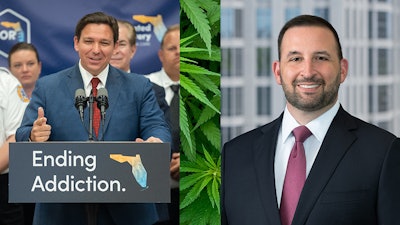
The first bill Florida Republican Gov. Ron DeSantis signed into law after taking office in January 2019 effectively ended the state’s ban on the consumption of smokable medical cannabis—such as flower and prerolls—by qualified patients.
That ban was enacted by his predecessor, current U.S. Sen. Rick Scott, after 71% of Florida voters backed a medical cannabis legalization measure in 2016. DeSantis said he was ensuring the will of the voters was upheld when signing the 2019 legislation.
But just last week, DeSantis complained about the odor of smokable cannabis in states that have legalized it for adult use when asked about Florida’s pending ballot measure during a March 8 press conference.
“I’ve gone to some of these cities that have this everywhere,” he said. “It smells; there’s all these things. … I don’t want to be able to go to walk in front of shops and have this. I don’t want every hotel to really smell. I don’t want all these things.”
While DeSantis has publicly opposed legalizing adult-use cannabis in Florida since taking office, even saying “not while I’m governor” during a 2019 interview, the head executive also has made comments in recent weeks that has some wondering if he’s sending contradictory signals to the Supreme Court, Zachary Kobrin, partner at Saul Ewing, told Cannabis Business Times.
Kobrin, a Fort Lauderdale-based cannabis law and corporate attorney, is the former vice president and general counsel for Tallahassee-based Trulieve, the largest cannabis operator in Florida—with more than 130 dispensaries—that is backing Smart & Safe Florida’s 2024 adult-use ballot initiative with more than $40 million in contributions so far, according to the Department of State.
Notably, DeSantis told federal cannabis lobbyist Don Murphy in late January, “I think the [Supreme] Court is going to approve that, so it will be on the ballot” when asked about the measure, which is under the court’s judicial review to ensure the proposed language is clear and unambiguous and does not violate the state’s single-subject rule.
While this prediction by DeSantis, who appointed five of the state’s seven Supreme Court justices, could be nothing more than that—a prediction—some have speculated that there was a hidden message behind the governor’s comment, Kobrin said.
Editor's note: DeSantis' office did not respond to a request from Cannabis Business Times seeking clarity about his January comments.
“There were a lot of people that thought that DeSantis coming out was his way of signaling a message to the court that, ‘Do what you’ve got to do. It’s OK,’ which would be an interesting way to send a message to a court,” Kobrin said. “And if that’s the message that he wants to send to the court, most of which he’s appointed, then so be it.”
The Supreme Court’s justices have until April 1 to approve or reject the language, or to do nothing and allow the amendment to go forward without their input. Although, Kobrin said he doesn’t anticipate the court would deviate from its standard practice and use a “pocket rule,” per se. “I’ve never actually seen a court not say one way or the other,” he said.
But with the justices having heard oral arguments on the proposal in November, notably after state Attorney General Ashley Moody filed a four-part argument against allowing the measure to go before voters, the court now has less than three weeks to issue its opinion.
“We’re all sitting here waiting,” Kobrin said. “We are all waiting in anticipation. Listen, imagine you’re the group that put $40 million behind it; How do you think they feel waiting with anticipation?”
The anticipation for this year’s decision comes after the Florida Supreme Court ruled in 5-2 decisions in 2021 that a pair of previous attempts to legalize adult-use cannabis via the 2022 election were misleading and did not meet the legal standards to go before voters.
But the secret behind this year’s language is simplicity, according to those who back the measure.
RELATED: Florida’s 2024 Cannabis Ballot Measure’s Secret is Simplicity
DeSantis offered his perspective on the proposed amendment’s language during his March 8 press conference.
“It is the broadest language I think I’ve ever seen,” he said. “Basically, nobody could ever be regulated or penalized in any way for possessing or using this. I mean, what? You can’t regulate it near a school. You can’t tell people you can’t smoke. I mean, it seems to supersede any other regulatory regime that we have.”
The governor did not mention that the amendment states multiple times that nothing “prohibits the Legislature from enacting laws” for implementing forthcoming regulations.
Notably, much of the proposed constitutional amendment aims to adopt language for adult-use cannabis legalization that mirrors the state’s medical cannabis legalization language that voters approved in 2016 (after the state’s Supreme Court OK’d that year’s ballot measure).
Key provisions in the proposed 2024 constitutional amendment include allowing:
- existing medical operators to remain vertically integrated while expanding to a forthcoming adult-use market;
- the state Legislature to determine a process for licensing additional market entrants; and
- adults 21 and older to purchase and possess up to 3 ounces of dried flower or 5 grams of concentrate for personal use.
The amendment would have an effective date six months after approved by voters.
More specifically, the 2024 amendment leaves specific regulatory details for a forthcoming adult-use marketplace undefined and dependent upon future legislation should voters approve the measure.
So, when DeSantis said the measure includes “the broadest language” he’s ever seen, Kobrin said, “My gut tells me it’s a signal.”
“I think he is extremely measured in the verbiage he uses, especially when he is talking to reporters,” Kobrin said. “So, it would surprise me if he didn’t know exactly what he was doing by making a comment like that.”
The reality is, to some extent, the language is “broad,” Korbin said.
“It was crafted in a way to avoid the faults and the flaws of the past initiatives that failed,” he said. “So, to a certain extent, the onus is going to be on the Legislature to pass regulation implementing [adult-use legalization], which is how it should be. … It expressly says the Legislature can pass legislation regulating and how they see fit. So, my gut tells me that the governor knows exactly what he’s doing when he makes those comments.”
In addition to the 2024 ballot language differing from the past two adult-use proposals that the Supreme Court rejected, several “major Republican donors” are now invested in Florida’s medical cannabis companies, The Intercept reported.
State Democratic Rep. Anna Eskamani, who has sponsored adult-use cannabis legislation in Florida, told the news outlet in January that some elected officials in Florida have adjusted their positions on cannabis for financial reasons.
“Clearly there are economic motives here, including for Republican donors, to maintain the current system of vertical integration and legalize cannabis for recreational use,” she said.
Trulieve, in particular, has given more than $41 million to Republicans and Democrats alike since 2017, including $125,000 to the state’s Republican Party five months before DeSantis was reelected in 2022, according to The Intercept.
But do these financial implications hold weight in the state’s conservative Supreme Court?
After November’s oral arguments on the proposed amendment, Kobrin said he was more optimistic that the justices would decide in favor of legalization advocates this time around.
In one instance, when Jeffrey Paul DeSousa, chief deputy solicitor general for the Florida Attorney General, argued that the proposed ballot summary misleadingly suggests that the amendment would “allow” adult-use cannabis despite its illicit status under federal law—one of four key points—one justice challenged the state’s position.
“Help me understand what this does to inject confusion,” Justice John D. Couriel, a DeSantis appointee, said during oral arguments.
“Because it uses the word ‘allows,’” DeSousa said.
“Well, yeah, but c’mon. It also says, ‘Applies to Florida law.’ We can’t not read the context of the whole statement, right?” Couriel said. “And last [time], we agreed with that argument because the ball was hidden. Where’s the hidden ball? It says on the face of this that it applies to Florida law.”
The ballot summary also states that the amendment “does not change, or immunize violations of, federal law.”
Commenting on this verbiage of the amendment during the oral argument, Justice Charles T. Canady said, “I don’t know … how a voter could be confused by that. I’m just—I’m baffled by the argument.”
Kobrin said it seemed “somewhat clear” that the court was less inclined to agree with the Attorney General’s arguments than in the past, and that he felt “extremely hopeful” after the oral arguments that the justices would approve the language.
“Part of the Attorney General’s argument was that the precedent that the court held previously in adopting the medical [cannabis ballot language] was wrong and that they shouldn’t follow their own precedent,” he said. “Now, all of us on the other side of the world were going, is [Moody] really asking the Supreme Court to just admit it was wrong by adopting medical? … That’s what didn’t add up to us. You’re essentially asking the court to admit that their own precedent was wrong, which seemed out of step.”


























